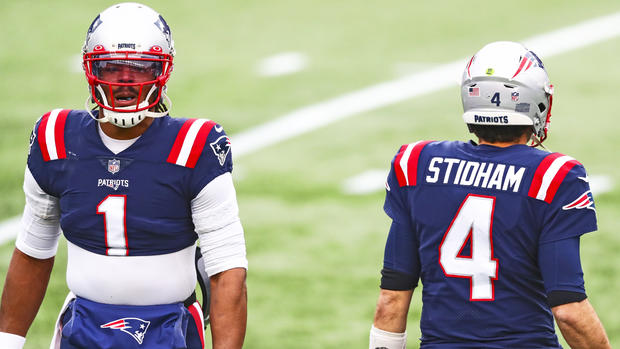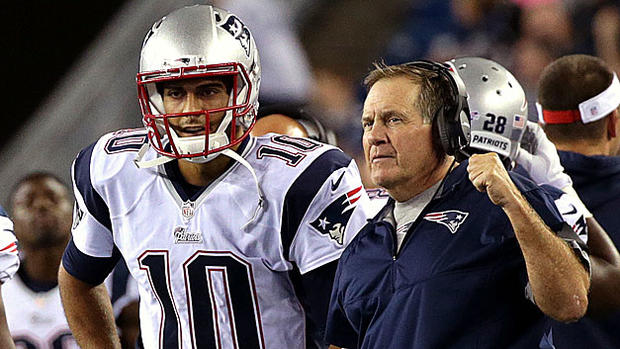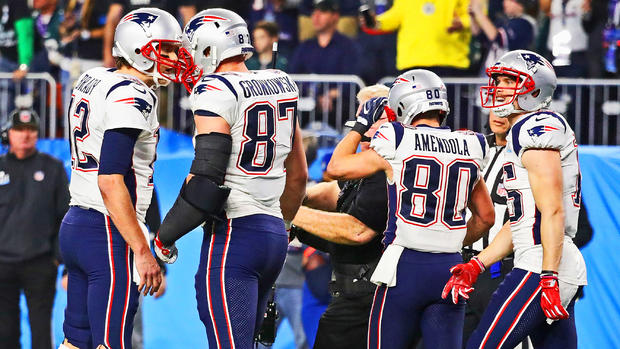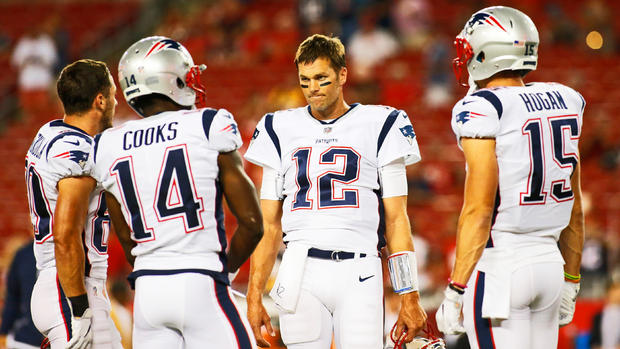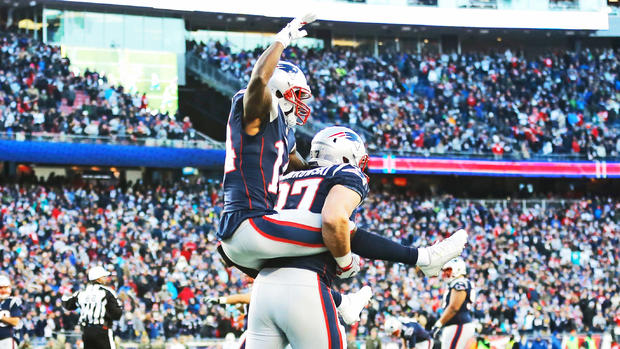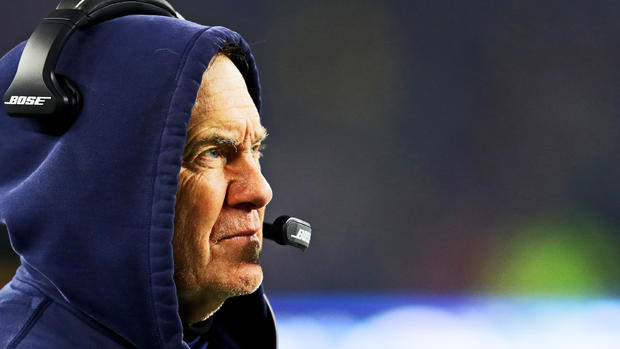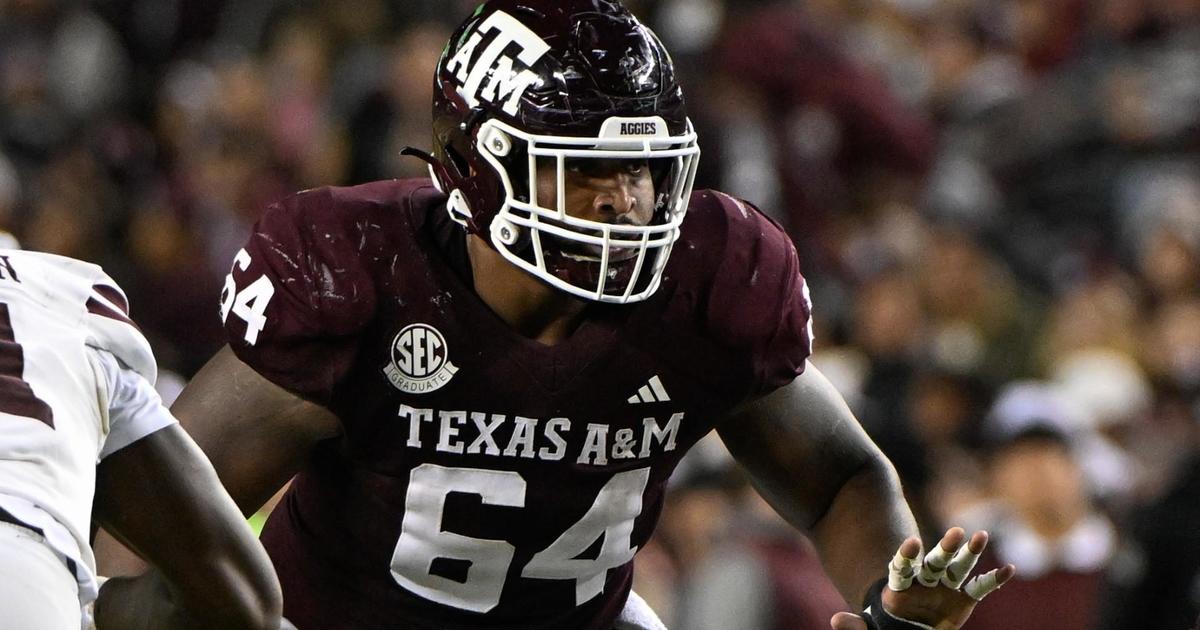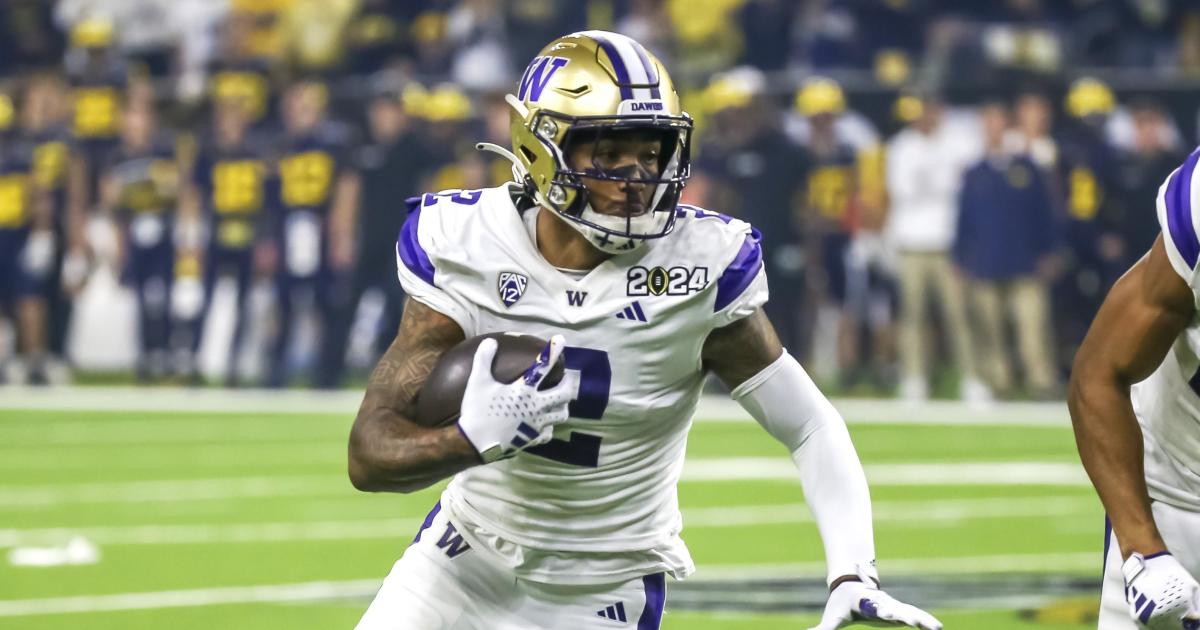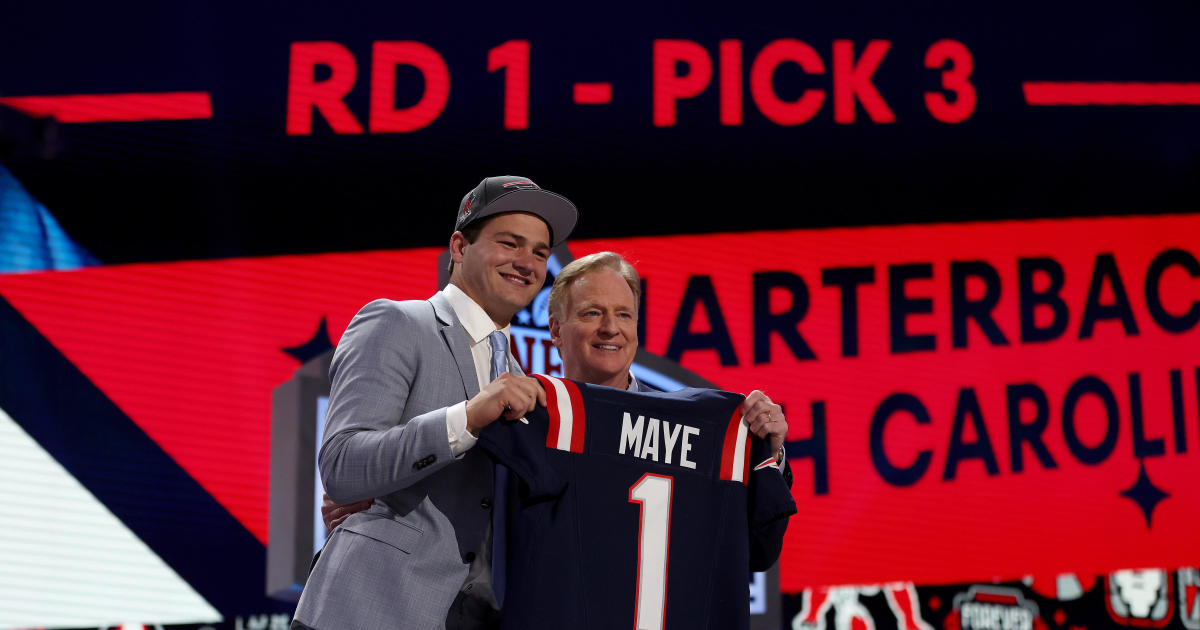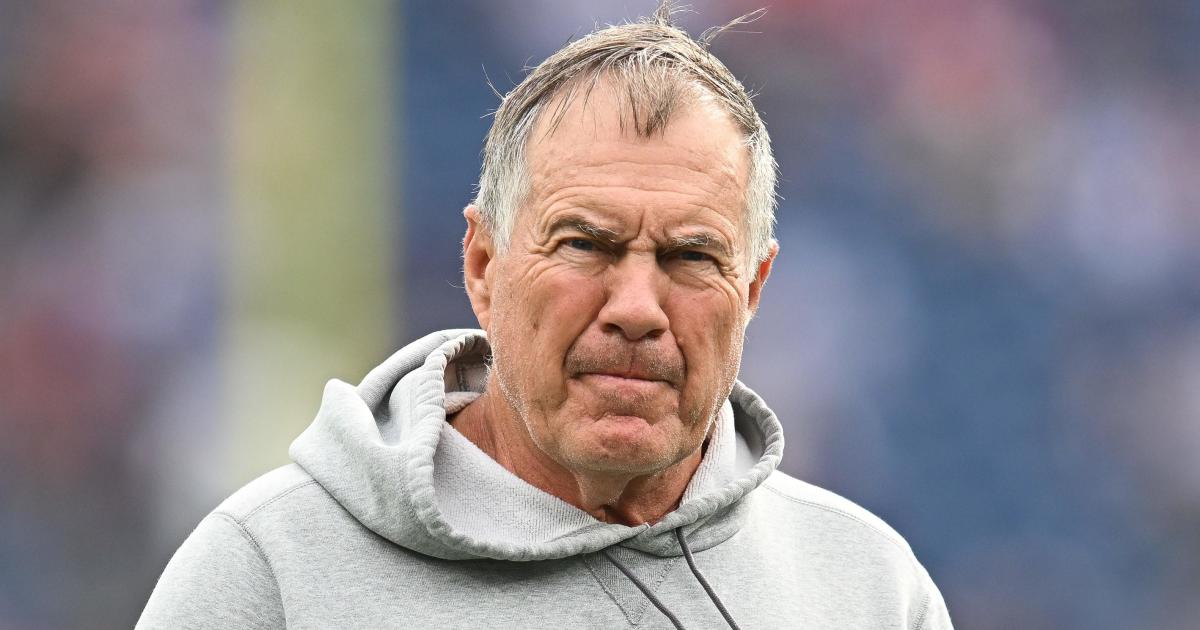Patriots Proven Wrong On Tom Brady Decision, But Belichick's Situation Is More Complicated Than That
By Michael Hurley, CBS Boston
BOSTON (CBS) -- Perhaps it's the bottom-line, results-oriented business of professional sports that drives discussions and debates to be ruled by black-and-white terms. A right, a wrong. A winner, a loser.
And so, with the 43-year-old Tom Brady preparing to play in the NFC Championship Game and with the Patriots' slim postseason hopes dying a month ago, it's only natural for the conclusion to be made that Tom Brady was right while Bill Belichick, Robert Kraft and the Patriots were wrong.
To be sure, a large portion of that assessment would obviously be correct. Brady had an incredible season at QB -- one of the finest of his Hall of Fame, GOAT-worthy career -- and the Patriots went 7-9. With the power of retrospect, there should be no doubt that the Patriots' decision to not commit to Brady through his 40s was a poor assessment.
Yet the matter is of course not so simple. The Patriots could have put themselves in a position to move on from Brady and still succeed without him, even if he was able to do the impossible and maintain his level of play at 43 and beyond. The fact that the team was caught in such a poor position in terms of offensive talent, salary cap space, and expiring contracts coming off a relatively down year in 2019 tells the broader story of how the Patriots ended up where they did in 2020.
NO SUCCESSION PLAN
Certainly, just about everyone in the world long ago accepted the possibility -- or even the probability -- that Tom Brady would not be finishing his career in a Patriots uniform. His outspoken desire to play to age 45 clashed with Belichick's tradition of breaking free from players at the end of their primes and before their twilights. Of the nine members of the Patriots Hall of Fame who played under Belichick, four finished their careers for different franchises. That trend led Brady's own father to say back in 2015 that "it will end badly" for his son in Foxboro.
So the idea of the Patriots at some point cutting ties with Brady was not particularly shocking. Even when it finally happened last March, it was not a jaw-dropping moment.
What was shocking was how unprepared the Patriots were for that moment from a roster perspective. At the time of Brady's announcement, New England had Jarrett Stidham and Cody Kessler under contract at the position. Shortly thereafter, they signed Brian Hoyer. And then, only because no other team was willing to contract the services of Cam Newton, a former MVP was available to them at a minimal salary at the end of June.
Needless to say, embarking on an offseason with that strategy at quarterback in a quarterback-driven league was a faulty course of action.
That conversation can't fully be held without referencing Jimmy Garoppolo. It's been documented seven different ways from Sunday that Bill Belichick believed in the QB out of Eastern Illinois to seamlessly succeed Brady in New England. And given that -- when healthy -- Garoppolo's been a mostly effective NFL quarterback, Belichick appears to have been mostly correct in that assessment.
Yet when it became clear that Brady wasn't going to physically fall apart, Belichick had to trade Garoppolo. Such is a requirement when the 40-year-old quarterback is the Most Valuable Player of the National Football League who would go ahead and set a Super Bowl record that year and then win the Super Bowl more than a full year after the trading away of his presumed successor. The Patriots and Belichick lost Garoppolo, but they surely made out pretty well.
Losing Garoppolo may have hurt the long-term plan, but the Patriots in the short term got an MVP season out of Brady, plus two Super Bowl appearances and a Super Bowl victory -- one that never would have happened if not for Brady's performance in the divisional round and conference championship. (His game-winning play in the fourth quarter wasn't bad, either.)
And, thanks to Brady returning to the Patriots in 2019, Belichick got an extra year to find the "next guy" -- either in the form of a young QB of the future or a reliable veteran to maintain the offense until that draftee came along. If no such quarterback emerged, well, Brady conveniently has no plans to stop playing, so an extension could always work as a fairly convenient backup plan.
Instead of tackling that issue head-on, the Patriots invested a seventh-round pick in Danny Etling in 2018 and a fourth-round pick on Stidham in 2019. In the meanwhile, the team gave Brady incentive-heavy contracts in 2017 and 2018, making him earn his money like none of his peers were or are forced to do, before an essential agreement in the summer of 2019 where the team determined it could only bear the burden of carrying Brady for one more season.
The "what if" game could be played endlessly, but in selecting Sony Michel and Isaiah Wynn, the Patriots did twice pass on Lamar Jackson in 2018, a year in which they also drated Duke Dawson in the second round. (Mason Rudolph, who may or may not prove to be an NFL-caliber QB, went in the third round.) In 2019, the Patriots went with N'Keal Harry over Drew Lock, settling for Stidham in the fourth round. (Gardner Minshew went to Jacksonville in the sixth round.)
That left the Patriots with the aforementioned Newton/Stidham/Hoyer trio for 2020. The team ranked 30th in passing yards, 31st in passing touchdowns, and 27th in overall offense, while throwing the 10th most interceptions. The Patriots scored their fewest points in a season since 2000, with their worst offensive ranking since 1992.
The quarterbacks weren't solely to blame for that, but the Patriots entering the year empty-handed at the most important position in sports was a dubious path to blaze.
And to make a long story short: The Patriots had a long time to establish a succession plan for the post-Brady era, even after trading Garoppolo. They didn't get it done.
GRADUAL LOSS OF OFFENSIVE TALENT
Consider this: In the 2017 season, the top four Patriots in receiving yards were Rob Gronkowski, Brandin Cooks, Danny Amendola, and Chris Hogan. The Patriots had the No. 1 offense in the NFL and No. 2 scoring offense, as well as the No. 2 passing offense with the third-most touchdowns through the air. Brady threw for 505 yards and three touchdowns in the Super Bowl.
In the offseason, Belichick traded Cooks, tried to trade Gronkowski to the Lions (only to be thwarted by a retirement threat), and let Amendola leave via free agency. Dion Lewis, who ranked second behind Cooks in yards from scrimmage, also left as a free agent.
Julian Edelman returned from injury in 2018, but the Patriots' passing game notably dipped. They were the eighth-best passing offense in the NFL, ranking 11th in touchdown passes.
Edelman was Brady's best receiver, while running back James White finished second on the team in receiving yards. Some temporary help from Josh Gordon (720 yards in 11 games) helped keep the Patriots' passing game afloat, but the significant loss of talent removed much of the oomph of that passing game. (Brady's numbers from 2017 to 2018 were somehow comparable, though.)
And instead of fixing that problem in 2019, it only got worse for the Patriots. N'Keal Harry at No. 32 was a miss. Trading a second-round pick for Mohamed Sanu only made matters worse. No pass catching tight ends were acquired to offset the loss of Gronkowksi.
After losing valuable players for three years without adding viable replacements, the 2019 Patriots offense was destined to fail. And it did.
In that sense, it truly would not have mattered much if the Patriots had committed to Brady for the 2020 season. Much like the 2019 group, the 2020 offense of the Patriots was not built to succeed. The Patriots would have been better with Tom Brady over Cam Newton, sure. But that would have been a low bar to clear, and it wouldn't have had the Patriots playing for a Super Bowl berth this weekend.
SALARY CAP RESTRAINTS
Everybody knows that the salary cap can be manipulated in various ways when needed. Whether it's through a complete restructure, a shifting of some bonus money, a pay cut, or something else, cap space can be created. But not always.
And last offseason, the Patriots left themselves with absolutely no room to spare when it came to improving the team. Even despite losing Kyle Van Noy, Jamie Collins and Danny Shelton to free agency and trading away Duron Harmon, the Patriots found themselves with less than $1 million in cap space at the end of March. New England had to juggle things around just to sign their top draft pick.
That lack of flexibility, according to Belichick, happened because the Patriots "sold out" to win Super Bowls. That part may have been true, but it doesn't mean that some wiser financial planning could have left the Patriots in a better financial spot entering 2020.
It also makes one wonder: Even if Brady accounted for a $13.5 million dead cap hit in 2020 ... how exactly could the Patriots have signed him even if they wanted to do so?
And if the understood agreement in the summer of 2019 settled on that being Brady's final season in Foxboro, how was a $13.5 million dead cap hit the most elegant solution?
While those answers may be difficult to pin down with precision, the bottom line is that Belichick left himself with no money to spend in free agency to improve his football team coming off the 2019 season. The "big" additions were Beau Allen, Damiere Byrd, Adrian Phillips, and Danny Vitale. Two of them never ended up playing a snap.
That cap situation was something known to Brady in the summer of 2019. If a pitch was made to Brady that money would be spent to help add valuable pass catcher to the offense, the specifics of how that would get done must have been interesting to hear.
Sure enough, after Brady's lowest touchdown total since 2006, and after leading the 15th-ranked offense in the NFL, the offense looked rather bad in 2019. After the season ended in the Wild Card Round for the first time since 2009, no known offer or effort was made by the Patriots to retain Brady's services. The writing that was scribbled on the wall the previous summer came to fruition, and Brady was left with two choices: hit free agency or retire.
Based on the way he's played in 2020 -- he threw for the second-highest single-season touchdown of his entire career and will be on the field in the NFC title game this weekend -- he made the right choice.
The Patriots, quite obviously, didn't make the right choice on Brady. But that's not entirely why they ended up where they were in 2020. Pinning it all on the Brady decision may make for a simple debate point, but the gradual decline of the Patriots' offense was clearly a bit more complicated.
You can email Michael Hurley or find him on Twitter @michaelFhurley.
